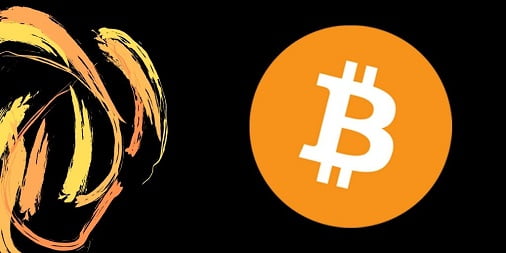What happens if crypo wins? One scenario….

WARNING: I apologize in advance for the length of this article!
There exist a lot of people who seem to be of the opinion that Bitcoin is an all or nothing proposition – that for it to succeed, other currencies, even countries, must fail. That itself seems at odds with reality – the Dollar coexists with the Pound, the Euro, the Renminbi, the Yen and the Franc. But still, what if the government decides to take the plunge and declare a cryptocurrency the legal tender of the land…?
For starters, I would doubt that the U.S. would switch to Bitcoin itself. The current owners of Bitcoin likely number just a few million people, but why would any of them want to accept dollars for their Bitcoins after the Government had announced its desire to move away from the dollar?
Without a means to transition its citizens from Dollars to Bitcoins, the Government would instead take the next approach, rolling their own cryptocurrency. Bitcoin has been resilient against its challengers (the “alts”) for a few reasons, primarily:
- First mover advantage; when people check out cryptocurrencies, the one they hear of first is Bitcoin.
- Most secure network; with over 300 petahashes per second behind it, Bitcoin’s blockchain is protected by the most computing power of all of the cryptocurrencies
- No other coin has differentiated itself enough to motivate the holders of Bitcoins to switch to a different cryptocurrency.
The government could immediately shift each of those to favor its own crypto:
- Bitcoin might have “first mover” advantage among the 4 million or so people who have so far gotten involved in crypto’s, “USCoin” would have first mover advantage in the minds of the other 325 million people in the country.
- It’s doubtless that the Government could bring far more hashing power to bear in securing USCoin’s blockchain than the Bitcoin community could muster.
- And, by mandating that it’s citizens receive payments in USCoin, that merchants accept USCoin, and taxes be paid in USCoin, there would be little impetus for citizens to further investigate cryptocurrencies. In short, the chicken and egg situation that we have now with Bitcoin, with many people holding them and just wishing there was a way to spend them directly,
It’s hard to envision a scenario where any government would choose to adopt an already existing crypto, rather than role one out themselves. Of course, any country (aside from the U.S. or China, perhaps) would face a new risk by adopting a cryptocurrency: How would they sufficiently secure their blockchains from attacks from 51% attacks (or simple DDOS attacks) from better-funded countries?
As an extreme example, think about what could happen to Bitcoin if it were adopted by the Democratic People’s Republic of Korea (“North Korea”) adopted as their national currency? Agree or disagree, the U.S. and the U.N. have imposed economic sanctions on them – what if the U.S., South Korea, Canada and the U.K. attempted to enforce those sanctions by 51%’ing the Bitcoin network and rejecting every attempted transaction?
I’m getting off the topic, though. What would things look like if we adopted Bitcoin (I’m just using Bitcoin as the example, rather than continuing to refer to a ficticous crypto, or using the much more of a mouthful “cryptocurrency”).
Crypto & Taxes
There exist one contingent that seems to believe that in a world under cryptocurrencies, people will no longer have to pay taxes. After all, with a private key under one’s sole control, no one can “force” another to pay, right?
For most people, the situation wouldn’t be any different that it is now. W-2 employees (the vast majority of workers here) work and get paid, with their taxes already withheld and paid over to the government with no interaction of their own. That system would continue, whether people get paid in Dollars, Bitcoins, or pebbles.
As for the entrepreneur that does business but refuses to pay tax? Yes, without obtaining your private key, the government couldn’t force you to pay tax, that is correct. They could deprive you of almost all of your other possessions though, or failing that, deprive you of your freedom. Your choice.
In a Bitcoin-denominated society, taxes will still be collected and paid.
Crypto & Security
I don’t know if it’s the sentiment of the community at large, or just from a vocal minority, but the ability to hold Bitcoins safely seems like it’s overlooked. Right now, we’re in the early adopter phase, where, in theory, we should all know the ins and outs of securing our Bitcoin. But we can’t. Whether it’s key loggers and other malware, easily guessed brain wallet passwords, shoddy exchanges or even bugs in unrelated software, thefts of Bitcoin happen all too regularly already. I personally shudder to think of what will happen in the case of mass adoption, at least at this point.
Yes… Bitcoin lets you “be your own bank” (to quote Blockchain.info), but most of the general populace have little interest in being their own banks, and even fewer will have the ability to keep their funds secure. Bitcoin takes off the “training wheels” that have provided consumer protections for almost a century now, and the world in general, and Bitcoin in particular, is far more complicated than it was when gold backed our currency.
Take your checkbook. If someone forges your signature on a check, you can immediately determine whose account it was deposited into, it’s written right on the face of the check. If the check was endorsed to someone else, again, it will say so. In the absolute worst case, they spend that stolen check at a store, there might be surveillance video or employees might be able to identify the thief. If the check were simply cashed at a bank or check-cashing store, more and more of them demand fingerprints before cashing a check for a non-account-holder.
If someone steals your Bitcoins, all you know is that they’re gone. You can see the address that they went to. And each subsequent address after that. But there is next to no way to determine who actually owns each address.
That’s not to say that researchers aren’t trying to come up with ways to help users better secure their Bitcoins – they are. But with the consequence of lax or faulty security being the irrevocable lost of ones coins, most neophytes could be best served by utilizing an insured company to watch after their coins.
Crypto & Safekeeping
What are the choices for securely holding Bitcoin today? Some combination of having an air-gapped computer to manage your private keys on, paper wallets, and, only recently now, hardware wallets. Lets throw the first choice out the window – certainly, we can’t expect that our entire populace will buy a second computer, which they’ll never connect to the internet with, in order to manage their bitcoins.
Without that air-gapped computer, though, paper-wallets go out the window as well. Or do we truly think that 95% of the population will understand why they should disconnect their computer from the internet when they’re generating their private keys? Heck, do we even think that a good number of those people will know how to do that? Paper wallets may seem like great solutions to early adopters, but nobody should think that they’ll have any roll for the general population.
The other option are hardware wallets. While SatoshiLabs’ Trezor wallet appears to be a safe option, they certainly won’t maintain monopoly power over the hardware wallet market. It might just be that I’m not familiar with them, but to me hardware wallets open up a brand new avenue to criminals; in my mind, it’s a certainty that a shady developer will one day introduce backdoored hardware wallets that generate private keys that the developer has knowledge or control over.
So what to do then?
Crypto & Banks
Many Bitcoin community comment about the fees banks change for wire transfers or the time it takes an ACH transaction to settle, and finish that observation with something that goes more or less like “your time is up, banks!”. That supposes that banks’ primary business is the transfer of money. That’s not the case. Yes, they collect fees for conducting wire transfers, but those fees are negligible compared to the total income they generate. ACH Transfers are generally offered for free, and BillPay is at best a break-even service, but can lose them money in the form of printing and postage to payees that can’t accept e-payments.
Banks got their start long before funds transfers were an every day activity. Instead, their original roll was in providing safekeeping services for their customers’ (usually) gold deposits. And that is a role that they could continue to fulfill for vast swaths of the population.
Another service they provide, and one which makes them the vast majority of their profit these days, is in providing access to credit markets. Fractional reserve banking? Many will roll their eyes, but it’s likely an eventuality. Banks have long known that they don’t need to keep 100% of their customers deposits as cash. Each customers balance, whether an individual or business, tends to increase as time goes by, and most of those funds would be otherwise be idle if not for lending.
To my mind, this is a good thing. Some say that peer-to-peer lending can fill the void left by banks, but that’s debatable at best. A banks underwriting committee can sign off on mortgage that could potentially include a few dollars from thousands and thousands of customers with relative ease; if that same borrower relied on the peer-to-peer model, the underwriting process, would be much more drawn out, as individual lenders each conducted their own reviews before pledging a few bits toward the loan. On a one off basis, it works. But were peer-to-peer be primary means of providing credit, the system would immediately overwhelmed.
Bitcoin banks would end up providing multiple benefits, just as they do today: safekeeping of assets and access to credit.
Crypto & Paper Money
Bitcoin transactions take time to settle, it’s a fact of life. There are different schools of thought as to how deal with that fact. Some advocate for a faster block time, others simply say that for low-value transactions, even a transaction with zero confirmations should valid. And some advocate for “green” addresses; whereby spending addresses that come from a known “issuer” of those addresses could be considered to be valid.
Taking green addresses a step further, what if parties want to transact but were without an internet connection? What if they simply didn’t want to have to wait for blockchain confirmations? Or what if, out of privacy concerns, they didn’t want the transaction appearing on the blockchain? What then?
Is it far off to imagine that a trusted party could issue different denominations of Bitcoin on paper? Not paper wallets – those wouldn’t be appropriate in the above situations, where without internet connectivity, funds couldn’t be verified. Likewise, payments made via exchange of paper wallets would be reversible until the payee moved the funds from the paper wallet that he or she received to a new address that only they controlled.
Instead of exchanging paper wallets, people would exchange serialized pieces of paper, each backed by Bitcoins held by the papers issuer. With no keys printed on the paper itself, the transaction would be irreversible once the paper changed hands. So long as both parties trusted the issuer of the paper, just as they would need to trust the issuer of “green addresses”, they could transact anywhere, anytime, without concern for the blockchain.
Sound Familiar?
Mind you, the future I laid out is only one possibility. But in this scenario, the “new” Bitcoin-denominated world looks remarkably like the Dollar-denominated world which it replaced.
Many in the community lambast fiat currency for having nothing of value backing it, and champion Bitcoin, as it is “backed” by the blockchain. In this version of the future, the currency they are using is indeed backed by the blockchain, but the world continues to look like a familiar place, especially to the uninitiated, complete with banks and paper currency. Bitcoin “pro’s” could transact solely on the blockchain, while others could use paper money or take on debt from banks, each making their own decisions.
Is that heresy? I don’t think it needs to be.
Relevant news

7 most efficient cryptocurrency mining hardware September 2023
The Top 7 most efficient cryptocurrency mining hardware September 2023 Crypto mining is the process…

How to Mine Cryptocurrencies: A Beginner’s Guide
How to Mine Cryptocurrencies: A Beginner’s Guide Cryptocurrencies are digital assets that use cryptography to…

Celebrities Who Have Endorsed Crypto Projects and Their Impact to Those Projects
Initially, only a few financial gurus and the like showed interest in cryptocurrencies. However, over…

Petition to Include Blockchain and Cryptocurrency Lessons in Higher Education Courses
Blockchain represents the 2nd generation of the Internet and holds te potential to disrupt money,…

Blockchain Technology in the Automotive Industry
Since the inception of the automotive industry 1885, the industry has undergone an extensive transformation,…

How Cryptocurrency Donations Can Benefit Non-Profit Organizations
Charity donations are not the first thing that comes to mind when you hear cryptocurrencies.…
